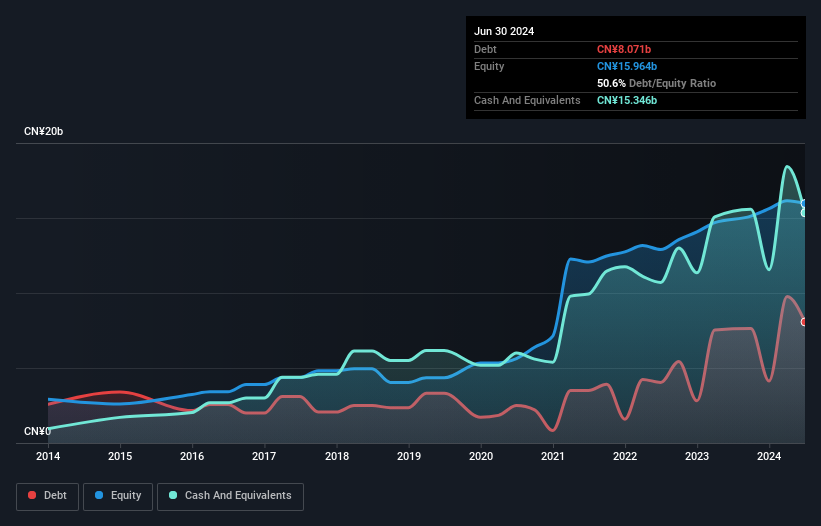Does Tianneng Battery Group (SHSE:688819) Have A Healthy Balance Sheet?
David Iben put it well when he said, 'Volatility is not a risk we care about. What we care about is avoiding the permanent loss of capital.' So it seems the smart money knows that debt - which is usually involved in bankruptcies - is a very important factor, when you assess how risky a company is. Importantly, Tianneng Battery Group Co., Ltd. (SHSE:688819) does carry debt. But the more important question is: how much risk is that debt creating?
When Is Debt Dangerous?
Debt and other liabilities become risky for a business when it cannot easily fulfill those obligations, either with free cash flow or by raising capital at an attractive price. Part and parcel of capitalism is the process of 'creative destruction' where failed businesses are mercilessly liquidated by their bankers. However, a more common (but still painful) scenario is that it has to raise new equity capital at a low price, thus permanently diluting shareholders. Of course, debt can be an important tool in businesses, particularly capital heavy businesses. When we examine debt levels, we first consider both cash and debt levels, together.
Check out our latest analysis for Tianneng Battery Group
How Much Debt Does Tianneng Battery Group Carry?
You can click the graphic below for the historical numbers, but it shows that as of June 2024 Tianneng Battery Group had CN¥8.07b of debt, an increase on CN¥7.63b, over one year. But it also has CN¥15.3b in cash to offset that, meaning it has CN¥7.28b net cash.

A Look At Tianneng Battery Group's Liabilities
The latest balance sheet data shows that Tianneng Battery Group had liabilities of CN¥22.0b due within a year, and liabilities of CN¥4.10b falling due after that. On the other hand, it had cash of CN¥15.3b and CN¥4.45b worth of receivables due within a year. So its liabilities total CN¥6.27b more than the combination of its cash and short-term receivables.
While this might seem like a lot, it is not so bad since Tianneng Battery Group has a market capitalization of CN¥31.3b, and so it could probably strengthen its balance sheet by raising capital if it needed to. However, it is still worthwhile taking a close look at its ability to pay off debt. While it does have liabilities worth noting, Tianneng Battery Group also has more cash than debt, so we're pretty confident it can manage its debt safely.
In fact Tianneng Battery Group's saving grace is its low debt levels, because its EBIT has tanked 21% in the last twelve months. Falling earnings (if the trend continues) could eventually make even modest debt quite risky. There's no doubt that we learn most about debt from the balance sheet. But it is future earnings, more than anything, that will determine Tianneng Battery Group's ability to maintain a healthy balance sheet going forward. So if you want to see what the professionals think, you might find this free report on analyst profit forecasts to be interesting.
Finally, a company can only pay off debt with cold hard cash, not accounting profits. Tianneng Battery Group may have net cash on the balance sheet, but it is still interesting to look at how well the business converts its earnings before interest and tax (EBIT) to free cash flow, because that will influence both its need for, and its capacity to manage debt. During the last three years, Tianneng Battery Group produced sturdy free cash flow equating to 54% of its EBIT, about what we'd expect. This cold hard cash means it can reduce its debt when it wants to.
Summing Up
While Tianneng Battery Group does have more liabilities than liquid assets, it also has net cash of CN¥7.28b. So we don't have any problem with Tianneng Battery Group's use of debt. The balance sheet is clearly the area to focus on when you are analysing debt. But ultimately, every company can contain risks that exist outside of the balance sheet. Be aware that Tianneng Battery Group is showing 2 warning signs in our investment analysis , and 1 of those is a bit concerning...
If you're interested in investing in businesses that can grow profits without the burden of debt, then check out this free list of growing businesses that have net cash on the balance sheet.
Have feedback on this article? Concerned about the content? Get in touch with us directly. Alternatively, email editorial-team (at) simplywallst.com.
This article by Simply Wall St is general in nature. We provide commentary based on historical data and analyst forecasts only using an unbiased methodology and our articles are not intended to be financial advice. It does not constitute a recommendation to buy or sell any stock, and does not take account of your objectives, or your financial situation. We aim to bring you long-term focused analysis driven by fundamental data. Note that our analysis may not factor in the latest price-sensitive company announcements or qualitative material. Simply Wall St has no position in any stocks mentioned.
 Index Options
Index Options CME Group
CME Group Nasdaq
Nasdaq Cboe
Cboe TradingView
TradingView Wall Street Journal
Wall Street Journal